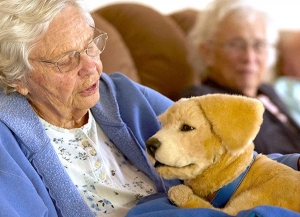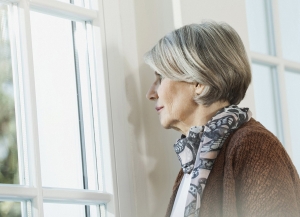A therapeutic innovation launched during the COVID-19 pandemic is making its way into mainstream care of older adults who live alone and those who have dementia. Lifelike robotic cats and dogs are an effective way to help seniors enhance social interaction, improve symptoms of depression, and reduce feelings of loneliness. These robotic pets can even be purchased by family members to gift to a loved one – perfect for the holiday season.
Loneliness Increases among Older Adults in Winter Months
Feelings of loneliness, depression, and isolation can increase dramatically during the winter months, particularly around the holiday season. Among older adults, these feelings can become overwhelming – worsening their symptoms and increasing risk for accidents and even suicide. Research shows that something as simple as a lifelike pet cat or dog can significantly improve wellbeing for older adults, including those with Alzheimer’s Disease and other dementias.
Therapeutic Animatronic Dog or Cat Enhances Social-Emotional Wellbeing for Seniors
The positive impact of these therapeutic robotic pets include improved mood and affect, better communication and meaningful social interaction, including having a sense of being needed by the companion robot pet.
Additional positive emotions experienced when interacting with a therapeutic robotic pet include:
- Joy
- Surprise
- Empathy
- Gentleness
- Connection
Older adults who have access to a robotic pet may also have better outcomes during a hospitalization, including less delirium, loneliness, fewer falls, and reduced need for a 1:1 companion. Some studies point to older adults with a robotic pet having enhanced cognitive function, less agitation, and less anxiety; although more research is needed in these areas.
Animatronic Therapeutic Pets Ideal for Seniors in Many Living Arranagements
Initially launched in the spring of 2020, in a partnership between Ageless Innovation and the Department of Elder Affairs in Florida (among other states) the program provided lifelike Joy for All Companion Pets® as a means to facilitate and enhance interaction between an older adult and their caregivers and family members. Since the end of the pandemic, the therapeutic robotic pets have been used in a variety of settings including senior centers, hospitals, nursing homes, memory care facilities, and senior living communities.
Mood Enhancing Behaviors for Older Adults with a Therapeutic Robotic Pet
Some of the mood enhancing interactions that have been observed between seniors and their therapeutic robot pets include:
- Cuddling
- Grooming
- Petting
- Sleeping with the pet
- Naming the pet
- Taking the pet with them on outings
- Playing
- Gathering in a communal area to talk to others about their “pet”
- Intergenerational connection between an elder and a young child
Features of the Robotic “Thera-Pet”
The robotic pet cat or dog (and now birds are available) has motion sensors in the head, cheek, back, tummy and other areas so the animatronic can respond to petting. Each also has sound effects (purrs, cries, barks), which can be turned off for an elder with audio sensitivity. The fur is very soft and inspired by the texture of real animal coats. The “pets” can mimic a “nuzzling” action, can detect light in the room and respond to it with vocalizations, can bark and purr depending on movement and room setting. The robotic pets come in a variety of colors, too.
To discuss incorporating a Joy For All Companion Pet into the care plan for your loved one, please inquire with your health care provider. If your loved one is a resident at one of the Everbrook Senior Living Communities, please inquire with our Wellness staff. If your loved one is not a resident at one of our beautiful communities schedule a visit today.
Resources
Florida Department of Elder Affairs
Hudson J, Ungar R, Albright L, Tkatch R, Schaeffer J, Wicker ER. Robotic Pet Use Among Community-Dwelling Older Adults. J Gerontol B Psychol Sci Soc Sci. 2020 Oct 16;75(9):2018-2028. doi: 10.1093/geronb/gbaa119. PMID: 32789476; PMCID: PMC7566965.
Koh WQ, Ang FXH, Casey D. Impacts of Low-cost Robotic Pets for Older Adults and People With Dementia: Scoping Review. JMIR Rehabil Assist Technol. 2021 Feb 12;8(1):e25340. doi: 10.2196/25340. PMID: 33497349; PMCID: PMC8082946.
Ihamäki P, Heljakka K. Robot Pets as "Serious Toys"- Activating Social and Emotional Experiences of Elderly People. Inf Syst Front. 2021 Aug 14:1-15. doi: 10.1007/s10796-021-10175-z. Epub ahead of print. PMID: 34413702; PMCID: PMC8364409.
Petersen S, Houston S, Qin H, Tague C, Studley J. The Utilization of Robotic Pets in Dementia Care. J Alzheimers Dis. 2017;55(2):569-574. doi: 10.3233/JAD-160703. PMID: 27716673; PMCID: PMC5181659.





